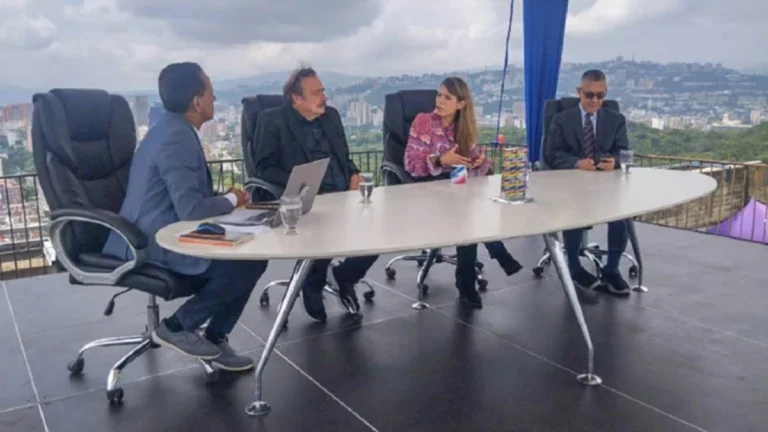teleSUR Marks 20 Years as Voice of the Global South, Faces New Communication Challenges

Ignacion Ramonet (2L) and Patricia Villegas (2R).
July 24, 2025 Hour: 8:04 am
‘We’ll be needed more than ever if we stay true to who we are and what we have been,’ Villegas stressed.
On Wednesday, Cuba’s “Round Table” program aired a special broadcast from Caracas, Venezuela, featuring journalist Patricia Villegas, president of teleSUR, a multimedia news platform celebrating its 20th anniversary.
RELATED:
9th OPEC International Seminar: TeleSur and Its Role in Energy Information
“Our greatest challenge is to never forget that teleSUR is the communicational expression of the revolutions of Our Americas and the struggles of the Global South’s peoples,” Villegas said and emphasized the importance of understanding transformations in communication in order to adapt to emerging dynamics without losing the essence of teleSUR, a project launched on July 24, 2005.
Spanish-French journalist Ignacio Ramonet also participated, stating that teleSUR’s biggest challenge is to become indispensable. “When you’re so saturated with information, you need something like a vaccine—a different point of view,” he said.
“teleSUR is the voice that brings balance and guides you along the right path. That’s what teleSUR must be: something addictive but also a corrective to address the harms coming from transnational mainstream media,” Ramonet added.
Addressing the censorship efforts teleSUR has faced since its founding, Ramonet noted that today’s communication processes are controlled by platforms owned by a very small group of ultra-wealthy individuals, including Elon Musk.
“There is a privatization of the world’s dominant messages. We ourselves use those platforms to express our views because they’re connected to a large portion of humanity,” he said and cited the words of Venezuelan President Nicolas Maduro, who called for the creation of communication platforms from the Global South.
“In the Global South, where BRICS countries now represent more than half of the world’s population, we must build channels that don’t depend solely on a handful of U.S.-based billionaires,” Ramonet said.
Cuban President Miguel Diaz-Canel’s text reads, “teleSUR was born 20 years ago, on the Liberator’s birthday. Since that day, the people of Our America have had their own voice and image to tell their truths. Congratulations to you, dear Patricia Villegas, and to your entire brave team. Thank you on behalf of Cuba.”
Villegas highlighted that in its first 20 years as an alternative media project, teleSUR’s team has shown it can master a communication style and aesthetic centered on human experience.
For that reason, teleSUR has never been dazzled by technical tools or forgotten its core mission: to identify the root of the problem.
“In the coming years, communication generated by humans will be of immense value. As long as teleSUR maintains that focus, it will stand apart in a world where the denunciation of genocide matters less than the superficiality of trivial news, such as celebrity infidelity,” she explained.
Recently, during the presentation of the Anibal Nazoa Journalism Award in Venezuela, President Maduro stressed that communication is as vital as securing food and medicine for the population. Villegas echoed that sentiment, urging people not to forget the roots of communication in the age of artificial intelligence.
“Nothing is more important than the concrete problems of everyday life. Media cannot reject the entire universe of AI or fear confronting it. But we must remember where we come from and who we are,” she said.
“People expect and demand from us. We will be needed more than ever if we stay true to who we are and what we have been,” the teleSUR president concluded.
teleSUR/ JF
Source: teleSUR






